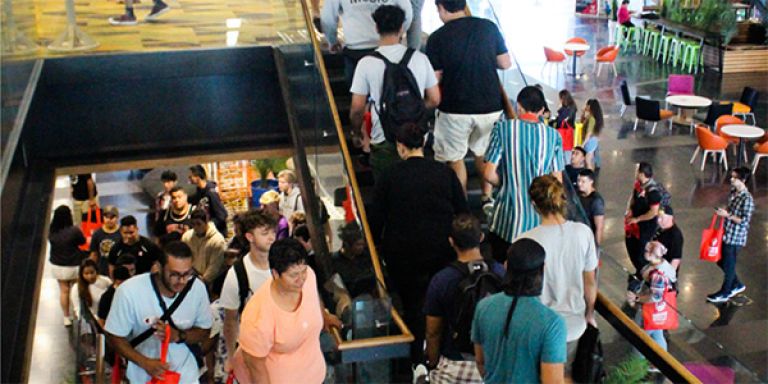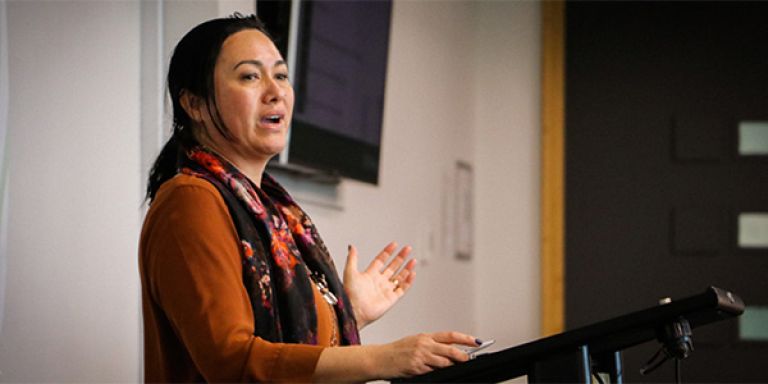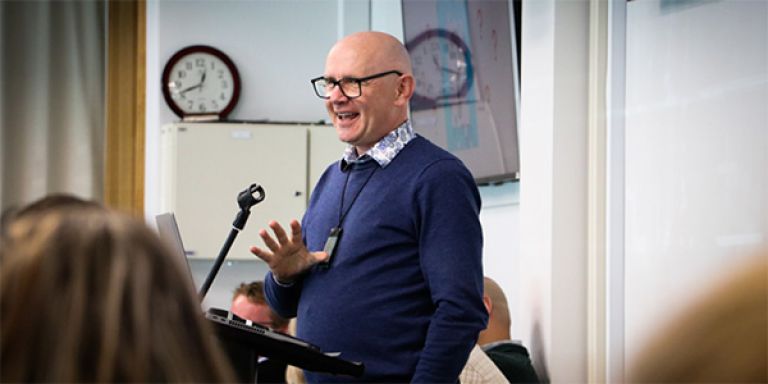- Study
- Areas of study
- Baking, Culinary and HospitalityWhether you want to be a baker, chef or barista in a local café or work in an international hotel chain, there is a wide range of excellent jobs for you to choose from. Gain the skills to create rewarding experiences for customers in an industry that is constantly evolving. As an MIT graduate, you’ll have the hands-on skills and the support you need to find success working in your chosen field.
- BusinessFind out how facts, figures, and technology combine to help people and companies succeed. Choose from a range of business and administration specialisations or majors and develop the skills and knowledge you need to get a job or advance your career.
- Digital TechnologiesWith skills in Information Technology (IT), you can play a big part in the success of industries that not only drive the modern world, but can also completely change how it works. Our programmes have been developed after working with schools, businesses and the community to include all the components to ensure your success in this field. Our strong industry relationships mean you keep up with the latest advances and techniques that are in demand in the real world. Our certificate and diploma qualifications will provide you with general IT skills. Our bachelor of digital technologies will further develop and focus your interests and experience into a more specific area. Choose to specialise in networking, software and web development or data analytics.
- EducationWhether your passion is early childhood, primary, secondary or tertiary teaching, or adult education, our programmes will help put you on the path to a meaningful career, with a recognised qualification and real-world experience. Educators are at the heart of building confident children and strong, positive communities. Now more than ever, the world needs dedicated educators who enjoy helping people of all ages develop to their full potential.
- EngineeringIf you want to learn how to build roads, bridges and plan other infrastructure projects, or if you’re into finding out how machines or electrical and electronic technologies work, develop the skills you need for an exciting career in engineering, with lots of possibilities. Our internationally-recognised courses suit everyone, from beginners to people who have already got related experience and allow you to enter the industry faster than a traditional four-year Bachelor of Engineering. If you want to go on to higher study at university, our programmes will open the door for you. Whatever your pathway, our excellent support services and connections to local industry will set you up for success after graduation.
- EnglishEnglish is important for anyone wanting to live, work or study in Aotearoa New Zealand. Want to learn English? MIT has full-time and part-time English programmes for all levels, plus short courses for preparation to employment or study. Our English courses will help you develop your speaking, listening and writing skills. You will become confident using English in everyday situations, at work or for studying, and you will be taught by friendly, supportive teachers and learn alongside people from different backgrounds and countries.
- FloristrySet yourself up for a career in the flower industry with MIT. You will learn to develop your own sense of style in floral design. Gain hands-on skills in creating floral arrangements for a range of events, including weddings. Our graduates go on to exciting careers working for a range of retailers and event organisers. At MIT we have the latest facilities, including a modern chiller, storage rooms and a bright and spacious teaching space modelled on a floristry retail shop.
- Foundation and Bridging StudiesFoundation studies will help you on your journey towards further study or employment. MIT’s Foundation and bridging programmes help you develop the study skills, confidence and independence you need for higher learning – and we support you every step of the way. Our courses in English, inclusive education, employment preparation, engineering, business, nursing, social services and police studies will prepare you for further training and a variety of future employment opportunities.
- HairdressingAt MIT you will become familiar with all the professional equipment, products, and creative techniques in our working hair salon. You will even get to cut, colour, set and blow-dry hair for real clients. These skills and training will get you a great start in a highly flexible career, with options to join an existing salon, run your own business or work as a stylist for fashion, film and television.
- Health and CounsellingGet a career in an essential industry and make a real difference to people’s health and wellbeing. Study one of our recognised qualifications in healthcare and you’ll open the door to a rewarding career helping others make positive changes. You’ll learn how to care for people, families and entire communities. Whether you want to become a health support worker, mental health and addiction support worker or counsellor, we can help you get there. Our programmes will give you the skills and confidence to change lives.
- MaritimeCareers in the maritime industry are well-paid and a qualification from MIT’s New Zealand Maritime School (NZMS) could take you around the globe. All seagoing ships, be they cruise liners, freighters or technical and research vessels, need physically fit, independent crew who work well as a team. If you love the ocean and are good at technical subjects, launch your training at the best facility New Zealand has to offer.
- NursingWant to make a real difference caring for people in your community? A career in nursing might be for you. The industry needs more essential workers who are passionate about improving health outcomes for others. You could work locally or abroad in a range of different specialities. When you graduate from one of our nursing programmes, you’ll be ready to sit the Nursing Council of New Zealand State Examination and apply for registration as an enrolled or registered nurse in New Zealand. You’ll be supported to succeed throughout your journey with access to a Kaiawhina, a Pasifika support person, a Whānau and a Mā Tātou room.
- Pacific languages and Te Reo MāoriReady to reconnect with your cultural identity or keen to discover how learning a language can connect you with people at your work and in your community? Whether you’re starting from scratch or keen to strengthen your communication skills, we offer a number of different Pacific language and Te Reo Māori options, from one-day cultural competency courses to certificate-level study. Discover how learning a new language can enrich your life.
- Police Preparation
- Social WorkIt takes a special kind of person to work with people. Now more than ever, our communities need social workers and support workers. Get the special skills you need to help people of all ages and cultures, from individuals to families and whānau. Learn specialist techniques in communication, dealing with challenging situations through self-awareness and self-insight, and gain the tools to safely work with a diverse range of clients in a social services environment. Our classrooms are supportive learning environments that promote independence and confidence. Be the change you want to see in your community.
- Sport, Recreation and Exercise ScienceSport is a richly satisfying career, where you can make positive changes to people’s lives. We welcome anyone who loves being physically active, wants to teach and inspire others to be physically active and is looking for a career in an industry that affects peoples’ lives for the better. Our team of experienced staff has close links with the Counties Manukau community and regionally through teaching, coaching or their current/past sporting achievements. Our practical grassroots programmes have a strong industry focus, to equip you with the right skills for a rewarding career in sport, recreation, education, fitness or the outdoors. Our continuous engagement and collaboration with our communities and industry ensures that our curriculum is current, and our students are prepared to start working in the sporting industry. We pride ourselves on our encouraging environment, which will set you on a positive pathway. By studying with us you’ll be personally challenged, learn the value of teamwork, become leaders of young people and see first-hand the impact of sport on community spirit. As a qualified professional, you can share your passion for sport and exercise in a range of settings. You could coach elite sports people or teams, and there are…
- Supported Learning (Inclusive Education)
- TradesBecome a tradie and get a career that will set you up for life. Study with MIT and you will get the hands-on experience you need to succeed in your chosen trade. It doesn’t matter your level of education or experience. We have a course that suits you.
- Upcoming intakes
- Free* study options
- Open entry
- Flexible study
- Short courses
- Baking, culinary and hospitalityMIT’s school of culinary and hospitality studies is a unique restaurant training school. Established in 1993, our purpose-built facility combines the latest technology with lecturers whose up-to-date experience in the industry is backed by academic expertise. As well as MIT’s full-time and part-time programmes, a number of short courses are also available for those wanting to retrain or upskill in areas like food safety and barista skills.
- EngineeringAs well as the breadth of full-time programmes available at Manukau Institute of Technology, we also offer a number of short courses.
- Māori language and cultureCome to Ngā Kete Wānanga Marae, the marae at MIT and develop your knowledge of Māori culture and language. Our programmes are designed to give you the confidence to embrace te reo me ona Tikanga (Māori language and protocols). Find more about Ngā Kete Wānanga Marae and the pōwhiri process (the formal welcome onto the marae) here.
- MaritimeOur academic year runs from mid-January until December, although many of our block/short courses allow students to commence studies throughout the year. Our courses are structured to minimise disruption to work commitments and many are offered in either modular, flexible or distance learning formats. All of our maritime courses also include practical hands-on experience using our up-to-date training equipment, computer-based training (CBT) programmes and the full mission bridge and engine room simulation centre. We are associated with Siemens and are the only training provider in New Zealand for PLC training. Further information on the available courses, entry criteria, Maritime New Zealand mandatory requirements, accommodation, fees and estimated living costs are available for both local and international students.
- PasifikaCome to the Pasifika Community Centre at MIT and get some insight and experience with a Pacific perspective. Our face-to-face and customisable workshops are focused on accelerating engagement with Pacific peoples and will help you to better appreciate or reconnect with Pacific culture, language, values, beliefs, and practices and get better at communicating and working with people in your community and workplace. Find more about Pasifika at MIT here.
- Preparation for employment and everyday lifeWe’re here to help you on your journey towards finding a job or further learning. We have courses for New Zealand citizens or permanent residents, usually for people who don’t have school qualifications. Our tutors are all from different backgrounds. They’ll help you develop your communication and job search skills, as well as your confidence and independence so you’re ready for work. We’ll support you every step of the way. Our courses in English, literacy and numeracy will prepare you for working or further training. Let’s make it happen together.
- Workplace AssessmentWorkplace assessment is the process of assessing skills and knowledge on the job. We offer a fully on-line training option which is tailored to meet a variety of specific industry requirements. Successful participants will be qualified to assess workplace performance, against the prescribed unit standards and assessments for their industry.
- Recognition of Prior Learning
- International Students
- Why choose MIT?
- Apply and enrol
- Areas of study
- Student life, resources and support
- Campuses and facilities
- Māori at MIT
- Pasifika
- About
- Contact
- Study
- Baking, Culinary and HospitalityWhether you want to be a baker, chef or barista in a local café or work in an international hotel chain, there is a wide range of excellent jobs for you to choose from. Gain the skills to create rewarding experiences for customers in an industry that is constantly evolving. As an MIT graduate, you’ll have the hands-on skills and the support you need to find success working in your chosen field.
- BusinessFind out how facts, figures, and technology combine to help people and companies succeed. Choose from a range of business and administration specialisations or majors and develop the skills and knowledge you need to get a job or advance your career.
- Digital TechnologiesWith skills in Information Technology (IT), you can play a big part in the success of industries that not only drive the modern world, but can also completely change how it works. Our programmes have been developed after working with schools, businesses and the community to include all the components to ensure your success in this field. Our strong industry relationships mean you keep up with the latest advances and techniques that are in demand in the real world. Our certificate and diploma qualifications will provide you with general IT skills. Our bachelor of digital technologies will further develop and focus your interests and experience into a more specific area. Choose to specialise in networking, software and web development or data analytics.
- EducationWhether your passion is early childhood, primary, secondary or tertiary teaching, or adult education, our programmes will help put you on the path to a meaningful career, with a recognised qualification and real-world experience. Educators are at the heart of building confident children and strong, positive communities. Now more than ever, the world needs dedicated educators who enjoy helping people of all ages develop to their full potential.
- EngineeringIf you want to learn how to build roads, bridges and plan other infrastructure projects, or if you’re into finding out how machines or electrical and electronic technologies work, develop the skills you need for an exciting career in engineering, with lots of possibilities. Our internationally-recognised courses suit everyone, from beginners to people who have already got related experience and allow you to enter the industry faster than a traditional four-year Bachelor of Engineering. If you want to go on to higher study at university, our programmes will open the door for you. Whatever your pathway, our excellent support services and connections to local industry will set you up for success after graduation.
- EnglishEnglish is important for anyone wanting to live, work or study in Aotearoa New Zealand. Want to learn English? MIT has full-time and part-time English programmes for all levels, plus short courses for preparation to employment or study. Our English courses will help you develop your speaking, listening and writing skills. You will become confident using English in everyday situations, at work or for studying, and you will be taught by friendly, supportive teachers and learn alongside people from different backgrounds and countries.
- FloristrySet yourself up for a career in the flower industry with MIT. You will learn to develop your own sense of style in floral design. Gain hands-on skills in creating floral arrangements for a range of events, including weddings. Our graduates go on to exciting careers working for a range of retailers and event organisers. At MIT we have the latest facilities, including a modern chiller, storage rooms and a bright and spacious teaching space modelled on a floristry retail shop.
- Foundation and Bridging StudiesFoundation studies will help you on your journey towards further study or employment. MIT’s Foundation and bridging programmes help you develop the study skills, confidence and independence you need for higher learning – and we support you every step of the way. Our courses in English, inclusive education, employment preparation, engineering, business, nursing, social services and police studies will prepare you for further training and a variety of future employment opportunities.
- HairdressingAt MIT you will become familiar with all the professional equipment, products, and creative techniques in our working hair salon. You will even get to cut, colour, set and blow-dry hair for real clients. These skills and training will get you a great start in a highly flexible career, with options to join an existing salon, run your own business or work as a stylist for fashion, film and television.
- Health and CounsellingGet a career in an essential industry and make a real difference to people’s health and wellbeing. Study one of our recognised qualifications in healthcare and you’ll open the door to a rewarding career helping others make positive changes. You’ll learn how to care for people, families and entire communities. Whether you want to become a health support worker, mental health and addiction support worker or counsellor, we can help you get there. Our programmes will give you the skills and confidence to change lives.
- MaritimeCareers in the maritime industry are well-paid and a qualification from MIT’s New Zealand Maritime School (NZMS) could take you around the globe. All seagoing ships, be they cruise liners, freighters or technical and research vessels, need physically fit, independent crew who work well as a team. If you love the ocean and are good at technical subjects, launch your training at the best facility New Zealand has to offer.
- NursingWant to make a real difference caring for people in your community? A career in nursing might be for you. The industry needs more essential workers who are passionate about improving health outcomes for others. You could work locally or abroad in a range of different specialities. When you graduate from one of our nursing programmes, you’ll be ready to sit the Nursing Council of New Zealand State Examination and apply for registration as an enrolled or registered nurse in New Zealand. You’ll be supported to succeed throughout your journey with access to a Kaiawhina, a Pasifika support person, a Whānau and a Mā Tātou room.
- Pacific languages and Te Reo MāoriReady to reconnect with your cultural identity or keen to discover how learning a language can connect you with people at your work and in your community? Whether you’re starting from scratch or keen to strengthen your communication skills, we offer a number of different Pacific language and Te Reo Māori options, from one-day cultural competency courses to certificate-level study. Discover how learning a new language can enrich your life.
- Police Preparation
- Social WorkIt takes a special kind of person to work with people. Now more than ever, our communities need social workers and support workers. Get the special skills you need to help people of all ages and cultures, from individuals to families and whānau. Learn specialist techniques in communication, dealing with challenging situations through self-awareness and self-insight, and gain the tools to safely work with a diverse range of clients in a social services environment. Our classrooms are supportive learning environments that promote independence and confidence. Be the change you want to see in your community.
- Sport, Recreation and Exercise ScienceSport is a richly satisfying career, where you can make positive changes to people’s lives. We welcome anyone who loves being physically active, wants to teach and inspire others to be physically active and is looking for a career in an industry that affects peoples’ lives for the better. Our team of experienced staff has close links with the Counties Manukau community and regionally through teaching, coaching or their current/past sporting achievements. Our practical grassroots programmes have a strong industry focus, to equip you with the right skills for a rewarding career in sport, recreation, education, fitness or the outdoors. Our continuous engagement and collaboration with our communities and industry ensures that our curriculum is current, and our students are prepared to start working in the sporting industry. We pride ourselves on our encouraging environment, which will set you on a positive pathway. By studying with us you’ll be personally challenged, learn the value of teamwork, become leaders of young people and see first-hand the impact of sport on community spirit. As a qualified professional, you can share your passion for sport and exercise in a range of settings. You could coach elite sports people or teams, and there are…
- Supported Learning (Inclusive Education)
- TradesBecome a tradie and get a career that will set you up for life. Study with MIT and you will get the hands-on experience you need to succeed in your chosen trade. It doesn’t matter your level of education or experience. We have a course that suits you.
- Student life
- Campus and facilities
- Māori
- Pasifika
- About
- ContactOpening hours:Location:
MIT Ōtara, Dilworth Building, NA Block, Gate 12, Ōtara Road, Ōtara
MIT Manukau, The Atrium, MIT Manukau, Corner of Manukau Station Road and Davies Avenue, Manukau
News and events
The latest news, events and updates from our Institute.


News and events
The latest news, events and updates from our Institute.
Get more for your future with a qualification from MIT
Contact Us
GENERAL ENQUIRY
0800 62 62 52
Send us a message
INTERNATIONAL ENQUIRY
+64 9 968 8742
international.application@manukau.ac.nz
Contact Us
GENERAL ENQUIRY
0800 62 62 52
Send us a message
INTERNATIONAL ENQUIRY
+64 9 968 8742
international.application@manukau.ac.nz
Contact Us
GENERAL ENQUIRY
0800 62 62 52
Send us a message
INTERNATIONAL ENQUIRY
+64 9 968 8742
international.application@manukau.ac.nz










